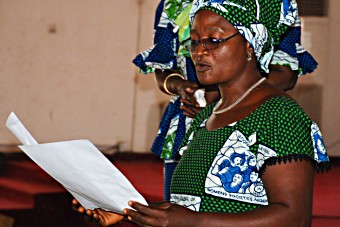
Town Hall meetings were held in six states ahead of Nigeria's April 16-17 Vaccine Summit, including this event in Lafia Nasarawa's town hall.
Baltimore, MD, United States, 17 April 2012 – A study released by the International Vaccine Access Center (IVAC) at the Johns Hopkins Bloomberg School of Public Health has identified the most feasible and impactful solutions for Nigeria’s immunisation programme that could offer the best hope yet for scaling up vaccine access to the nation’s most rural areas and taking aim at the country’s precipitous number of child deaths.
While the nation has made progress on child survival in recent years, Nigeria is still responsible for one out of every eight child deaths worldwide. The country is second only to India in number of annual child deaths, many of which result from diseases that can be prevented with vaccines.
600,000 lives in 10 years
Recent projections from Decade of Vaccines Economics (DoVE) show that by achieving 90% coverage with vaccines for the five leading childhood diseases – including Hib, pneumococcal disease, rotavirus, measles and pertussis – Nigeria could save more than 600,000 lives over the next 10 years and add US$17 billion to its economy.
Nigeria's Vaccine Summit and IVACIVAC is working with the Nigerian government, Nigerian Pediatric Association and Nigerian and international stakeholders to hold the first National Vaccine Summit in Abuja on April 16-17. The summit will bring together a broad range of stakeholders to discuss vaccines and catalyse political commitments and ownership of vaccine strategy to enhance access and delivery in Nigeria. Town Hall meetings in six states were held planned prior to the summit. Based at the Johns Hopkins University, IVAC is dedicated to accelerating global access to life-saving vaccines through development and implementation of evidence-based policies. IVAC projects are made possible by support from institutions, foundations and industry. |
The study – Landscape Analysis of Routine Immunization in Nigeria (LARI), which was conducted with the collaboration of the government of Nigeria and Solina Health – identified high-impact solutions in the areas of financing and vaccine security, transportation, cold chain technology, performance management, advocacy, leadership and demand creation that together have the potential to significantly improve vaccine access.
Currently, access to and availability of vaccines varies widely among the country’s 36 states and vaccine stock-outs remain common, particularly in the poorest and most remote areas.
Full promise of immunisation
“Nigerian government leaders have made major improvements in routine immunisations over the past three years,” said Dr. Orin Levine, Executive Director of IVAC.
But the full promise of immunisation and its economic benefits won’t be fully realised until vaccines reach every Nigerian child.”
Some of the specific solutions proposed in the LARI study include the establishment of government basket funds for local immunisation programmes; transportation contracts and ongoing vehicle maintenance to improve delivery from state cold stores to community clinics; provision of solar refrigeration and satellite cold storage units to keep vaccines at a viable temperature despite challenges involving distance and power outages; mid-level management training to staff responsible for vaccine delivery; and text message reminders and incentive programs such as conditional cash transfers to parents to improve vaccine uptake and timeliness.
The full promise of immunisation and its economic benefits won’t be fully realised until vaccines reach every Nigerian child. Dr. Orin Levine, Executive Director of IVAC |
Defining moment
“This is a defining moment, one in which we must take decisive action to put an end to deaths from preventable diseases, especially among our very young,” said Dr. Dorothy Esangbedo, President of the Paediatric Association of Nigeria.
“The only way to fully realise Nigeria's economic potential is to ensure that our children have the chance to become healthy, productive adults, and that won’t occur until all of our children have access to routine vaccination.”
Eight Nigerian states
As part of the LARI study, field interviews were conducted throughout eight Nigerian states in 2011, with a wide variety of stakeholders including state and local government representatives, clinics, parents and others throughout eight Nigerian states. The states were selected to represent the diversity in levels of performance and success in improving immunisation coverage.
“Given the significant burden of vaccine-preventable diseases in Nigeria, improving routine immunisation coverage would reduce child mortality and accelerate progress towards the MDG 4 target,” said Chizoba Wonodi, MD, MPH, DrPH, Epidemiologist at IVAC.
“With this report, policymakers will have the information they need to scale up vaccine access and save lives in Nigeria.”
Nigeria's push
Underscoring both the need for action and Nigeria’s push for improvements in vaccine coverage, key government leaders will gather in Abuja, Nigeria on April 16-17, 2012 to address critical gaps in vaccine delivery and consider steps to achieve universal vaccine coverage for all Nigerian children.
